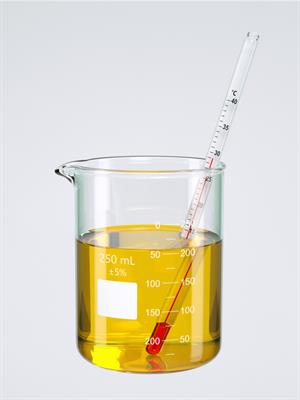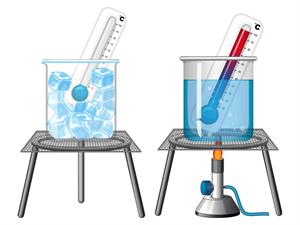
PUMPA - SMART LEARNING
எங்கள் ஆசிரியர்களுடன் 1-ஆன்-1 ஆலோசனை நேரத்தைப் பெறுங்கள். டாப்பர் ஆவதற்கு நாங்கள் பயிற்சி அளிப்போம்
Book Free DemoIn many scientific applications, it may need to measure the higher than \(42\)\(°C\) and lesser than \(35\)\(°C\). In such cases, clinical thermometers can't be used, and the need for laboratory thermometers arise. Laboratory or Lab thermometers are the instruments used to measure the temperatures for scientific research in schools and labs.
Laboratory or Lab thermometers are the instruments used to measure the temperatures for scientific research in schools and labs.

Laboratory thermometer
Lab thermometers are designed to measure substances' temperatures and also find the boiling point and freezing point.

Experimental setup to measure the temperature
In industries, it is used to measure the temperature higher than what clinical thermometers can do.
Structure of the laboratory thermometer:
- Compared to clinical thermometers, lab thermometers have a long narrow tube (stem) and bulb.
- Laboratory thermometers do not have a kink.
Temperature scale in laboratory thermometer:
- It has only the Celsius scale ranging from \(−\)\(10\)\(°C\) to \(110\)\(°C\).
Important!
Precautions to be followed while using a laboratory thermometer:
- Do not tilt (bend) the lab thermometer while doing the temperature measurement. Place it upright.
- Record the readings only when the substances from all the sides have surrounded the bulb.
- Make sure that the bulb is not be in contact with the bottom or sides of the container.
- While doing the measurements, do not move the thermometer.
Differences between clinical and laboratory thermometers:
Parameter to be compared | Clinical thermometer | Laboratory thermometer |
| Application | Clinical (Hospitals). | Scientific Research and Laboratories |
| Uses | It is used to measure the human body temperature. | It is used to determine the boiling point and freezing point of the substances. |
| Range | \(35\)\(°C\) to \(42\)\(°C\) / \(94\)\(°F\) to \(108\)\(°F\) | \(10\)\(°C\) to \(110\)\(°C\) |
| Structure | Mercury level does not fall on its own, as there is a kink near the bulb, which stops the mercury from returning into the bulb | Mercury level falls on its own as no kink is present. |
| Working | We can read the temperature after removing the thermometer from the armpit or mouth. | Temperature is read while keeping the thermometer in the temperature source, e.g. a liquid or any other thing. |
| Restoration | Jerks are given to lower the mercury level. | No need to give a jerk to lower the mercury level. |